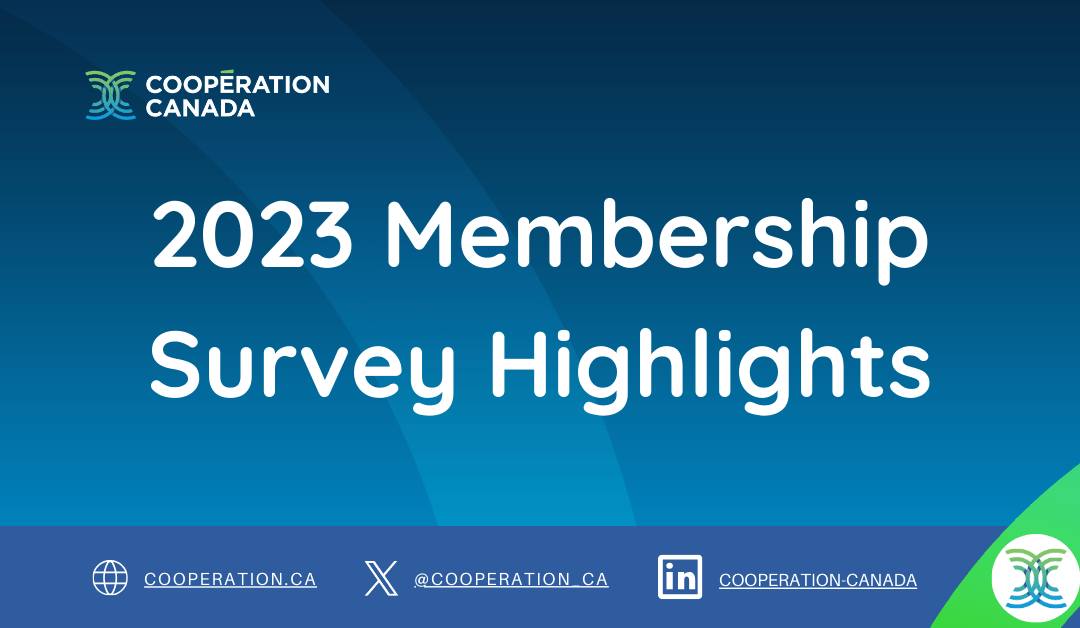Every two years, Cooperation Canada shares its Membership Survey with its members to assess their satisfaction and ensure that we remain relevant and responsive to their needs. This year, Cooperation Canada conducted its member satisfaction survey from October to December 2023.
51 out of the 102 members completed the survey, representing a response rate of 50%.
The 2023 survey afforded an opportunity for individuals from across member organizations to respond! Seventy-five (75) individuals from 51 member organizations responded to the survey. Respondents included a large proportion who identified as a Chief Executive Officer or Executive Director (44%), and a mix of individuals who worked in areas such as programming, communications and policy.
The objectives were to:
- Align Cooperation Canada’s work to members’ priorities, across all teams and initiatives;
- Inform Cooperation Canada’s annual planning with direct input from members; and
- Have a standard framework to measure member satisfaction over time.
Our seven takeaways
1. Our members are overwhelmingly satisfied with their Cooperation Canada membership.
91% percent of those who responded are satisfied with their Cooperation Canada membership, and just as many would recommend non-members to join us.
2. Our members are satisfied with how we are delivering on government relations, policy-related initiatives, advocacy and community animation and engagement.
The majority of respondents are satisfied with Cooperation Canada’s government relation efforts, specifically advocacy (86%), Global Affairs Canada engagement (84%), and policy analysis and research (83%). With respect to community animation, respondents showed 84% satisfaction in relation to working groups, member communications, and the member portal. Eighty-five percent (85%) of members are satisfied with our regular convening and events. There is room for us to improve in all these areas – members said our great events could have more member input, and future policy efforts could be better packaged with shorter, action-oriented research outputs on which members can engage.
3. Our thematic priorities – advancing Canada’ s global leadership, shifting power, protecting human rights and civic space, and supporting organizational resilience – continue to resonate with our members and their priorities.
Members are satisfied with the thematic priorities that guide Cooperation Canada’s work across the organization. Our focus on Canadian international cooperation and humanitarian leadership is seen as the biggest priority for our organization among those that responded to the survey. There is also strong support for initiatives related to shifting power such as localization and anti-racism, as well as for our efforts related to human rights and civic space. Additionally, members recognize organizational transformation as crucial for fostering trust and resilience within the sector.
4. We communicate a lot, and members can’t keep up!
While 82% of those who responded consider the work of Cooperation Canada to be important or essential for the work of their own organization, some struggle to connect with our work because of the breadth and depth of the content. Members recommend that Cooperation Canada improves communication mediums (such as our portal) and take a more targeted approach to dissemination to ensure that the right people can access the right information.
5. The Canadian landscape is changing, and members want support.
As the sector works to adopt a more decolonized and localized approach to international cooperation, they are also faced with a changing landscape in Canada related to a potential change in government, decreasing ODA, and the upcoming G7 presidency for Canada in 2025. In this context, members want Cooperation Canada to play a role in supporting efforts to ensure future government policies and practices align with global trends and support civil society. They would also like support to prepare for and navigate the uncertain future.
6. Our Working Groups are important, and we can do more to support them.
As a useful space for coordination, peer learning and thought leadership, our Working Groups are valued but could be better supported. In addition to technical issues with the portal and related communications notifications (that we are working to address with a new system!), the core work of the working groups could also be improved with more dialogue, ideation, and collaboration. Overall, while members appreciate the potential of Working Groups, they seek enhancements in engagement, inclusivity, and accessibility of participation to maximize their effectiveness.
7. Cooperation Canada’s relationship with Global Affairs Canada remains crucial for advancing sector priorities.
Partnership with Global Affairs Canada (GAC) is central to the work of many of our members. The survey showed that members appreciate Cooperation Canada’ s engagement with GAC and want more! Members specifically highlighted the importance of maintaining collaborative joint advocacy initiatives for transformation, particularly in areas such as funding models, the Grants & Contributions Transformation Initiative, and GAC accountability frameworks. While acknowledging the significance of GAC engagement, there’s a growing aspiration among respondents to align Cooperation Canada’s priorities and advocacy with broader global perspectives beyond just the Government of Canada.
We are committed to enhancing communication, engagement, and interaction with our members and working groups, leveraging the feedback provided by the survey to guide our efforts. The ongoing support of Cooperation Canada members is invaluable as we work towards a fairer, safer, and more sustainable world.

